 Petzlover
Petzlover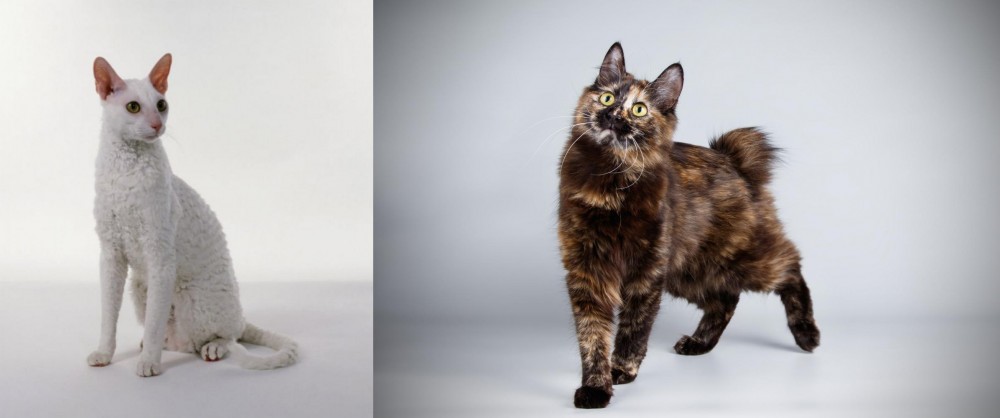 Cornish Rex is originated from United Kingdom but Japanese Bobtail is originated from Japan. Both Cornish Rex and Japanese Bobtail are having almost same weight. Cornish Rex may live 5 years more than Japanese Bobtail. Both Cornish Rex and Japanese Bobtail has same litter size. Both Cornish Rex and Japanese Bobtail requires Low Maintenance.
Cornish Rex is originated from United Kingdom but Japanese Bobtail is originated from Japan. Both Cornish Rex and Japanese Bobtail are having almost same weight. Cornish Rex may live 5 years more than Japanese Bobtail. Both Cornish Rex and Japanese Bobtail has same litter size. Both Cornish Rex and Japanese Bobtail requires Low Maintenance.
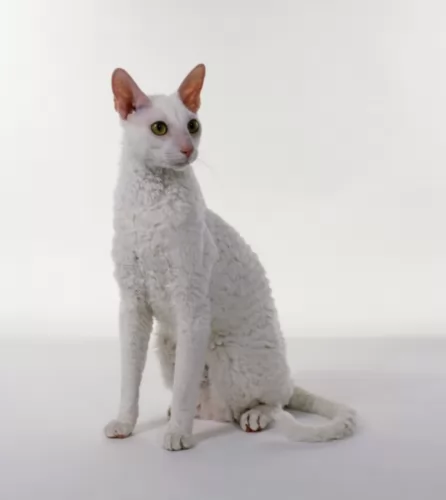 Cornwall is the birthplace of the unusual Cornish Rex cat – a curly-coated cat.
Cornwall is the birthplace of the unusual Cornish Rex cat – a curly-coated cat.
A kitten was born in 1950 and belonged to Nina Ennismore and Winifred Macalister. The other kittens had short hair but this unusual kitten had curly hair, the result of a spontaneous natural mutation.
A successful breeding program was started and it was in 1963 that the American Cat Fanciers Association as well as the and today it is recognized by all cat registries.
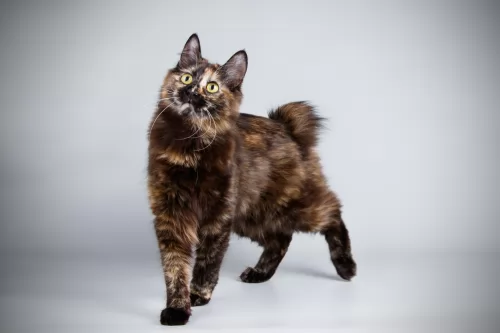 It is believed that these naurally-occuring short-tailed domestic cats in Japan arrived from the Asian continent about 1 000 years ago.
It is believed that these naurally-occuring short-tailed domestic cats in Japan arrived from the Asian continent about 1 000 years ago.
It was way back in 1602 that the Japanese authorities made it that all cats be released to tackle the rodent problem that were threatening the nation's silkworm population.
Bobtail cats were the street cats of Japan. In 1968, the cat was imported to the Western Hemisphere from Japan and in 1976 the shorthaired Japanese Bobtail was accepted for Championship status in the Cat Fanciers’ Association.
There are a number of cat’s breeders in North America and Europe, but it is still a rare cat. Today, the Japanese Bobtail is a recognized breed by all major registering bodies.
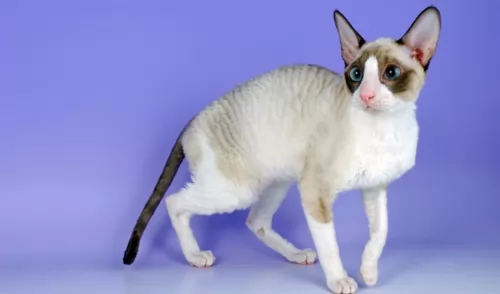 The Cornish Rex is a small to medium-sized cat weighing between 3 to 5kg. It’s a lithe, slender cat with a small, narrow head with big ears and eyes.
The Cornish Rex is a small to medium-sized cat weighing between 3 to 5kg. It’s a lithe, slender cat with a small, narrow head with big ears and eyes.
The cat has long, slender legs with a tail that is also slender and long. The hair is very fine and they are actually prone to hair loss. The coat has fine, short, silky hair. There can be a bit of a curl in the hair, The coat comes in many colors from white, silver, black, red, blue to chocolate and they can have different patterns too as well as bein bi-color.
The eyes can be gold, brown, or green. The torso is long and lean, the cat has a deep chest but strong hips and rear end that allow the Cornish Rex to leap with ease up onto perches.
The Cornish Rex loves his human family and loves spending time with them, whether that means fun and games or sitting in your lap.
He is intelligent and can learn a few tricks and is capable of learning to walk on a leash. He is a confident cat, playful and entertaining. Gentle and loving, he is a talkative cat, wanting to express his opinion about everything.
He will fit easily into different lifestyles, whether you’re single, a family, or in a retirement home, so long as he is receiving lots of attention.
He isn’t as frail as he looks and can get pretty active and social with children and dogs and may even beat the dog to fetching a small ball.
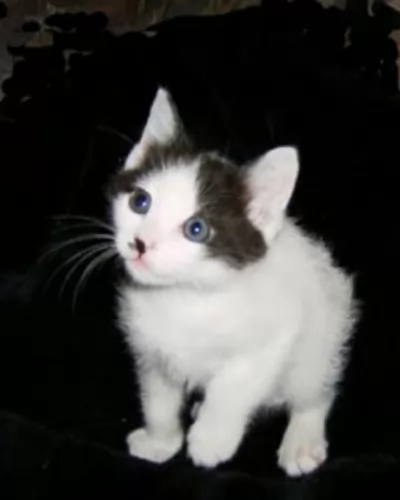 The medium-sized, long, lean and muscled Japanese Bobtail, with long slender legs, is known for its unusual bobtail. People liken the tail to that of a rabbit. The tail must always be visible though.
The medium-sized, long, lean and muscled Japanese Bobtail, with long slender legs, is known for its unusual bobtail. People liken the tail to that of a rabbit. The tail must always be visible though.
The head has a triangular shape and the neck is neither too long or too short. The ears are upright and set wide apart. The oval-shaped eyes are large.
The hind legs are longer than the front legs. The cat weighs between 3 and 6kg and comes in almost any color and pattern but it is thought that the triple-colored ones are the most favored in Japan.
The coat is of medium length and is soft and silky. The head of the cat is triangular with the ears being large and wide apart. The eyes are large and oval-shaped.
The Japanese Bobtail makes a good feline pet for families. They get on well with children and are affectionate and loving with all their human family members.
They’re talkative cats too, enjoying communication with people and using soft noises. It’s an intelligent cat and one that happens to love water too, and is a playful cat, making a great loyal companion.
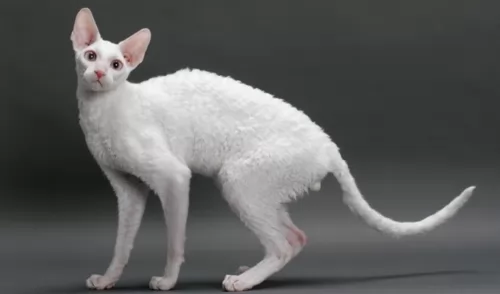 If you’re looking for a cat that can bring laughter and fun into the household, you won’t go wrong with a Cornish Rex as they will amuse and delight.
If you’re looking for a cat that can bring laughter and fun into the household, you won’t go wrong with a Cornish Rex as they will amuse and delight.
He is also a cat that doesn’t require a lot of fuss and bother, although he makes a fuss about the amount of attention he gets.
He doesn’t like being left alone for long, so a good idea is to work from home or to get a companion for him. Other than than, he makes the most splendid feline companion.
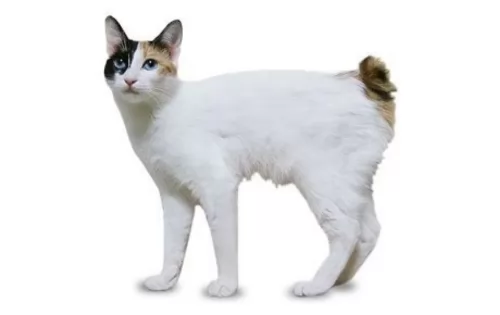 The Japanese Bobtail is such a sweet, playful, loving cat. The cat loves to be with his human family and is highly intelligent.
The Japanese Bobtail is such a sweet, playful, loving cat. The cat loves to be with his human family and is highly intelligent.
They are quite capable of learning tricks and playing games much like a dog. They are social cats and while they aren’t lap cats, they seek out the company of their human family, making use of a soft voice to communicate.
They’re such sweet cats and are adored by those who have brought them into their home as a pet and friend.
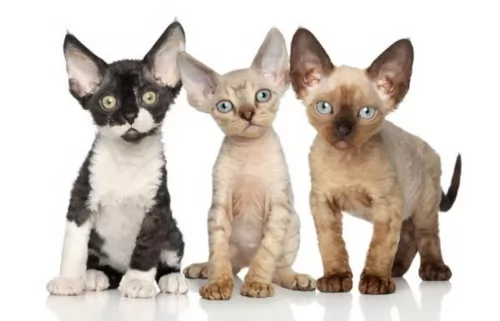 The Cornish Rex is a hardy cat with very few health issues. Certainly, because of the very fine hair, you’d have to be aware of sunburn.
The Cornish Rex is a hardy cat with very few health issues. Certainly, because of the very fine hair, you’d have to be aware of sunburn.
Cats can get sunburned and can be at serious risk of getting skin cancer later on. Be sun-smart and apply pet sunscreen.
Be careful of the type of sunscreen you use as your cat will likely want to lick it off. Other issues to look out for are hypertrophic cardiomyopathy. This is a common kind of heart disease in cats where there is a thickening in the wall of the heart.
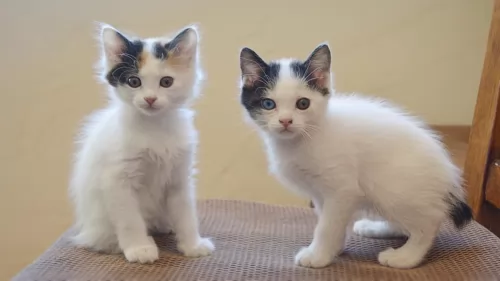 Just like any other cats, the Japanese Bobtail suffers from any one of the different health problems there are. The Japanese Bobtail is a healthy cat generally and he can easily reach 15 years of age with good care.
Just like any other cats, the Japanese Bobtail suffers from any one of the different health problems there are. The Japanese Bobtail is a healthy cat generally and he can easily reach 15 years of age with good care.
Look out for obesity. Obesity comes with a host of health issues, putting a strain on the cat’s joints as well.
You want to manage your furry friend’s food portions to ensure he remains lean and muscular. Feed your adult cat twice daily. Discover what your cat likes in terms of dry cat food, semi-wet or wet cat food.
Your cat is a carnivore and requires quality meaty foods. The best, high-quality cat foods always have meat at the top of the ingredients list as they need meat to get all the right nutrients in.
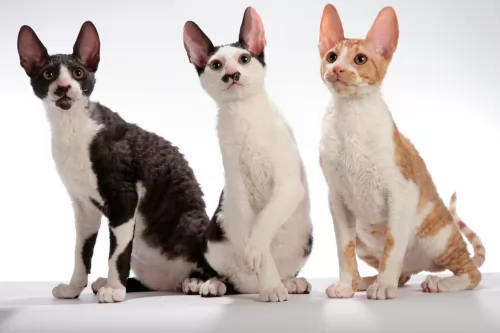 Grooming your Cornish Rex isn’t going to be an issue as the cat has very little hair. Although nothing is set in stone and some Cornish Rex’s have thicker coats, requiring more brushing. Maybe a soft brush once a week will be sufficient for this cat breed.
Grooming your Cornish Rex isn’t going to be an issue as the cat has very little hair. Although nothing is set in stone and some Cornish Rex’s have thicker coats, requiring more brushing. Maybe a soft brush once a week will be sufficient for this cat breed.
A good idea is to take a cloth of warm water and to gently wipe your cat so that he is free of dust.
Supply a litter box and make sure that you remove his droppings every single day.
Have your pet neutered or spayed if you don’t want unwanted kittens. These minor ops have many health benefits for your cat as well.
When you brush your cat, check his entire body out for any abnormalities. Check for new lumps, check inside the ears to make sure they are clean and free of redness which could indicate an infection.
Clip his toenails, make sure his eyes are clear and bright, free of discharge, and check inside his mouth to make sure there aren’t any bad teeth, as this could cause him a lot of discomfort.
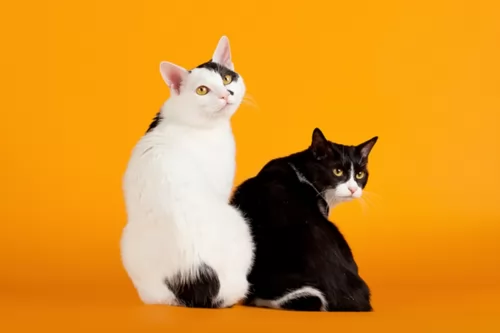 The cat’s medium coat sheds moderately, and a brush once a week to remove the loose hairs will be sufficient. You’ll want to brush him more often during his shedding seasons.
The cat’s medium coat sheds moderately, and a brush once a week to remove the loose hairs will be sufficient. You’ll want to brush him more often during his shedding seasons.
Help with keeping your Japanese Bobtail clean by scooping his droppings out of the litterbox at least every day and also changing the litter at least every week.
When you bring your Japanese Bobtail kitten home, you’ll have to take him to the vet. This is because from 8 weeks of age your kitten will need to get his first vaccines. Booster vaccines for your cat will also be required later on.
Provide your cat with a scratching post to prevent him from scratching your furniture.
Never leave your Japanese Bobtail without a constant supply of fresh, cool water.
Wash your cat’s water- and food bowls every second day to prevent bacteria from building up.